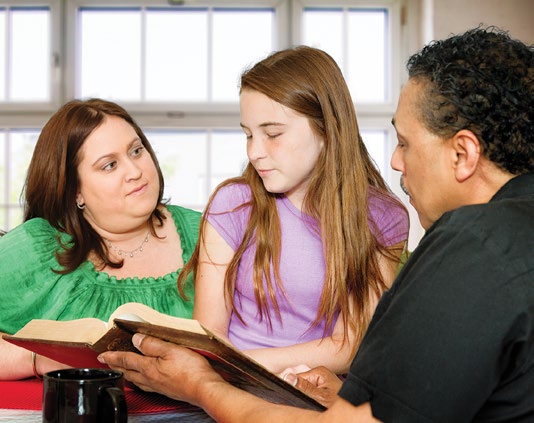Back to series


Questions and Answers: How Does God Want Me To Love My Neighbor?
Learn more in our Dawn Treader Magazine
 Polly: Hello, Con; how’s everything?
Polly: Hello, Con; how’s everything?
Connie: Oh, all right, Polly; I guess.
Polly: What’s wrong?
Connie: Well, that girl in my class—you know who I mean; she’s been causing me trouble again. It’s so hard! I—I don’t see how it’s possible for me to love her, the way Jesus says I should, and it makes me feel guilty on top of how embarrassed and angry she makes me by her behavior. How can I possibly ever get along with her? I simply can’t imagine it.
Polly: Perhaps you won’t ever “get along” with her, as you say. She would have to have a real heart change to get along properly with anybody nice. Of course, Jesus can arrange that for her; but she has to let Him. And you can’t control when or whether that will ever happen. Don’t worry about it.
Connie: But I can’t help worrying. If I can’t love her, does that mean I’ve failed as a follower of Jesus?
Polly: Well, what makes you so sure you don’t love her? Just because you don’t like her…
Connie: I heartily dislike her!
Polly: Okay, I understand how you feel. But you don’t have to like someone at all in order to love them.
Connie: Wait a minute; I’m confused. I’ve always thought that liking someone was part of loving them: that liking was the first step, and then it might become love if something more—I’m not sure what—was added on top of it. Come to think of it, Polly, I’m not sure I really understand what “love” means at all, in a general sense. I know what I mean when I say I love my mother—I can give concrete examples. But on the whole, love seems such a vague concept.
Polly: Well, it gets treated like a very vague concept in our society today, I will grant you that. I think the biggest problem is that the main focus has shifted from “loving our neighbor” particularly, to a vague “love of humanity” in general. And, quite frankly, love is not something we do “in general”; loving someone is always particular, individual, and practical.
The only way to love all of humanity is to love each one of them as an individual, and that requires far too much work and “thinking things through” to make it a popular concept in our modern world.
 Connie: I guess. I never thought about it that way before. But if love doesn’t mean just general liking and tolerance, hyped up with sentimentality, what does it mean? What do I have to do in order to love someone, really?
Connie: I guess. I never thought about it that way before. But if love doesn’t mean just general liking and tolerance, hyped up with sentimentality, what does it mean? What do I have to do in order to love someone, really?
Polly: Let’s start with the Bible — the best place to start. Jesus says we are to “love our neighbor as ourselves” (Matthew 22:39). To be perfectly honest with you, Connie, I used to have trouble with that definition myself. I figured that with proper Christlike love, we should really love our neighbor more than we love ourselves, always put their concerns before our own. And that’s quite true, of course — other passages of Scripture like the Parable of the Good Samaritan and all the verses about serving others, especially Jesus washing the disciples’ feet, make that very clear — but there is a particular aspect about the way we love ourselves that Jesus wants us to apply to our love for other people; it was C.S. Lewis who clarified that for me.
Connie: What did he have to say about that?
Polly: That the principles of the love we feel toward our neighbor must be the same ones that we apply to ourselves. It’s a long quote, but worth remembering; and I think I’ve got it here for you correctly: Now that I come to think of it, I have not exactly got a feeling of fondness or affection for myself, and I do not even always enjoy my own society. So apparently ‘Love your neighbor’ does not mean ‘feel fond of him’ or ‘find him attractive’ . . . Do I think well of myself, think myself a nice chap? Well, I am afraid I sometimes do (and those are, no doubt, my worst moments) but that is not why I love myself. In fact it is the other way round: my self-love makes me think myself nice, but thinking myself nice is not why I love myself. So loving my enemies does not apparently mean thinking them nice either. That is an enormous relief. For a good many people imagine that forgiving your enemies means making out that they are really not such bad fellows after all, when it is quite plain that they are. Go a step further… I can look at some of the things I have done with horror and loathing. So apparently I am allowed to loathe and hate some of the things my enemies do. Now that I come to think of it, I remember Christian teachers telling me long ago that I must hate a bad man’s actions, but not hate the bad man: or, as they would say, hate the sin but not the sinner.
 For a long time I used to think this quite a silly, straw-splitting distinction: how could you hate what the man did and not hate the man? But years later it occurred to me that there was one man to whom I had been doing this all my life—namely myself. However much I might dislike my own cowardice or conceit or greed, I went on loving myself… Just because I loved myself, I was sorry to find I was the sort of man who did these things. Consequently, Christianity does not want us to reduce by one atom the hatred we feel for cruelty and treachery. We ought to hate them… But it does want us to hate them in the same way in which we hate things in ourselves: being sorry that the man should have done such things, and hoping, if it is anyway possible, that somehow, sometime, somewhere, he can be cured and made human again…1
For a long time I used to think this quite a silly, straw-splitting distinction: how could you hate what the man did and not hate the man? But years later it occurred to me that there was one man to whom I had been doing this all my life—namely myself. However much I might dislike my own cowardice or conceit or greed, I went on loving myself… Just because I loved myself, I was sorry to find I was the sort of man who did these things. Consequently, Christianity does not want us to reduce by one atom the hatred we feel for cruelty and treachery. We ought to hate them… But it does want us to hate them in the same way in which we hate things in ourselves: being sorry that the man should have done such things, and hoping, if it is anyway possible, that somehow, sometime, somewhere, he can be cured and made human again…1
Connie: So, perhaps the best way I can approach trying to love the people who hurt me is by hoping they will start turning into heavenly creatures? Right now, I don’t feel as though I wanted to meet that girl in Heaven — if I really loved her as Jesus loves her, I would think and hope about the kind of person she could become, that I would want to meet in Heaven, and treat her that way?
Polly: Exactly. As C.S. Lewis explained, we must try to feel even about an enemy as we feel about ourselves —“to wish that he were not bad, to hope that he may, in this world or another, be cured: in fact, to wish his good. That is what is meant in the Bible by loving him: wishing his good, not feeling fond of him or saying he is nice when he is not. I admit that this means loving people that have nothing loveable about them. But then, has oneself anything loveable about it? You love it simply because it is yourself. God intends us to love all selves in the same way and for the same reason…”2
Ask your children: What do you think about Polly’s answers to Connie’s questions? Do you have any other questions of your own that this dialogue has brought up for you? Challenge them to think up more responses they could give, if someone asked them a question like Connie’s.
Notes
1 C.S. Lewis, Mere Christianity (New York: Touchstone, 1996), pp. 105-106
2 Ibid., p. 107-108.
C.S. Lewis Institute
Author
C.S. Lewis Institute, in the legacy of C.S. Lewis, works to develop wholehearted disciples of Jesus Christ who will articulate, defend, share, and live their faith in personal and public life. Founded in 1976 by Dr. James Houston and James R. Hiskey, the Institute provides leading teachers who address important issues of the day from the perspective of Biblical orthodoxy, while also providing discipleship for individuals in small groups.

 COPYRIGHT: This publication is published by C.S. Lewis Institute; 8001 Braddock Road, Suite 301; Springfield, VA 22151. Portions of the publication may be reproduced for noncommercial, local church or ministry use without prior permission. Electronic copies of the PDF files may be duplicated and transmitted via e-mail for personal and church use. Articles may not be modified without prior written permission of the Institute. For questions, contact the Institute: 703.914.5602 or email us.
COPYRIGHT: This publication is published by C.S. Lewis Institute; 8001 Braddock Road, Suite 301; Springfield, VA 22151. Portions of the publication may be reproduced for noncommercial, local church or ministry use without prior permission. Electronic copies of the PDF files may be duplicated and transmitted via e-mail for personal and church use. Articles may not be modified without prior written permission of the Institute. For questions, contact the Institute: 703.914.5602 or email us.
Speakers

C.S. Lewis Institute
Author
Team Members
C.S. Lewis Institute
Author
C.S. Lewis Institute, in the legacy of C.S. Lewis, works to develop wholehearted disciples of Jesus Christ who will articulate, defend, share, and live their faith in personal and public life. Founded in 1976 by Dr. James Houston and James R. Hiskey, the Institute provides leading teachers who address important issues of the day from the perspective of Biblical orthodoxy, while also providing discipleship for individuals in small groups.


